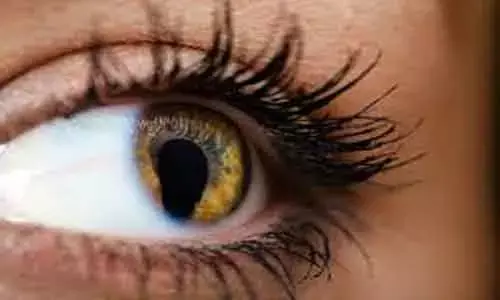- Home
- Medical news & Guidelines
- Anesthesiology
- Cardiology and CTVS
- Critical Care
- Dentistry
- Dermatology
- Diabetes and Endocrinology
- ENT
- Gastroenterology
- Medicine
- Nephrology
- Neurology
- Obstretics-Gynaecology
- Oncology
- Ophthalmology
- Orthopaedics
- Pediatrics-Neonatology
- Psychiatry
- Pulmonology
- Radiology
- Surgery
- Urology
- Laboratory Medicine
- Diet
- Nursing
- Paramedical
- Physiotherapy
- Health news
- Fact Check
- Bone Health Fact Check
- Brain Health Fact Check
- Cancer Related Fact Check
- Child Care Fact Check
- Dental and oral health fact check
- Diabetes and metabolic health fact check
- Diet and Nutrition Fact Check
- Eye and ENT Care Fact Check
- Fitness fact check
- Gut health fact check
- Heart health fact check
- Kidney health fact check
- Medical education fact check
- Men's health fact check
- Respiratory fact check
- Skin and hair care fact check
- Vaccine and Immunization fact check
- Women's health fact check
- AYUSH
- State News
- Andaman and Nicobar Islands
- Andhra Pradesh
- Arunachal Pradesh
- Assam
- Bihar
- Chandigarh
- Chattisgarh
- Dadra and Nagar Haveli
- Daman and Diu
- Delhi
- Goa
- Gujarat
- Haryana
- Himachal Pradesh
- Jammu & Kashmir
- Jharkhand
- Karnataka
- Kerala
- Ladakh
- Lakshadweep
- Madhya Pradesh
- Maharashtra
- Manipur
- Meghalaya
- Mizoram
- Nagaland
- Odisha
- Puducherry
- Punjab
- Rajasthan
- Sikkim
- Tamil Nadu
- Telangana
- Tripura
- Uttar Pradesh
- Uttrakhand
- West Bengal
- Medical Education
- Industry
Vision rehab treatment effective for stroke and injury-related blindness

MIAMI -Eye movement training has shown promise in a large number of studies involving compensatory approaches to rehabilitation of vision loss as a result of brain injury. Researchers at the University of Miami Miller School of Medicine have found that visual rehabilitation is effective for patients who have suffered vision loss related to stroke or traumatic brain injury.
The study titled "Efficacy and predictors of Recovery of Function After Eye Movement Training in 296 Hemianopic Patients," was recently published in the journal Cortex. It is the largest neuro-visual study of its kind.
The research team found that the NeuroEyeCoach visual rehabilitation therapy applied after stroke or another traumatic brain injury (TBI) improved vision in over 80 per cent of patients, helping them with everyday tasks and improving their quality of life. The results showed that the treatment improved vision even in a 90-year-old patients.
"Up to recently, there was very little treatment available to restore vision loss in this population," said Romano, noting that while stroke and TBI patients regain some vision on their own, "very few regain it completely."
Blindness among these patients usually stems from an injury to the back of the brain where images are interpreted. "Patients have a very poor quality of life as they often bump into things, cannot drive or read," said Romano.
The study involved almost 300 patients, the largest number of patients to participate in a study of this nature. Conducted in Europe, involving U.S. and European patients, the study revealed that patients achieve major improvements within 2-3 weeks of therapy. The findings showed that 87 percent of patients improved in search time and 80 per cent had made fewer errors leading to reduced disability.
Blindness after brain injury is common and its effect on the patient's daily life is sudden. Those affected have great difficulties navigating their way around and avoiding obstacles. The significance of this study is that the use of NeuroEyeCoach can lead to improved eye movements allowing better interaction with the environment. Not only are patients reducing their errors following the therapy, they are also seeing things much faster and state in their self-assessment that the therapy improves their activities of daily living, such as exploring their surroundings better, identifying obstacles and avoiding collisions.
Improvements were not dependent on age, gender, side of blindness, nor the time elapsed since the brain injury. The study also found that there was no upper age limit to the success of the treatment. This is the first time that a treatment of this kind has been shown to be effective in both old as well as young adults.
The study, which was funded by industry partner NovaVision Inc., also demonstrated that the therapy is highly beneficial to patients that state they have high levels of disability: 79 per cent of these patients said they had less disability after doing NeuroEyeCoach.
"Our results show that rehabilitation of vision loss after brain injury is possible and can drastically improve patients' quality of life," said Arash Sahraie, professor and chair in Psychology at the University of Aberdeen.
"The larger scale of this study has provided answers to important questions as to whether rehabilitation outcome is affected by how old people are when they suffer their injury or how long ago they had their vision loss, or even whether they are male or female."
for further references log on to:
Dr Kamal Kant Kohli-MBBS, DTCD- a chest specialist with more than 30 years of practice and a flair for writing clinical articles, Dr Kamal Kant Kohli joined Medical Dialogues as a Chief Editor of Medical News. Besides writing articles, as an editor, he proofreads and verifies all the medical content published on Medical Dialogues including those coming from journals, studies,medical conferences,guidelines etc. Email: drkohli@medicaldialogues.in. Contact no. 011-43720751


